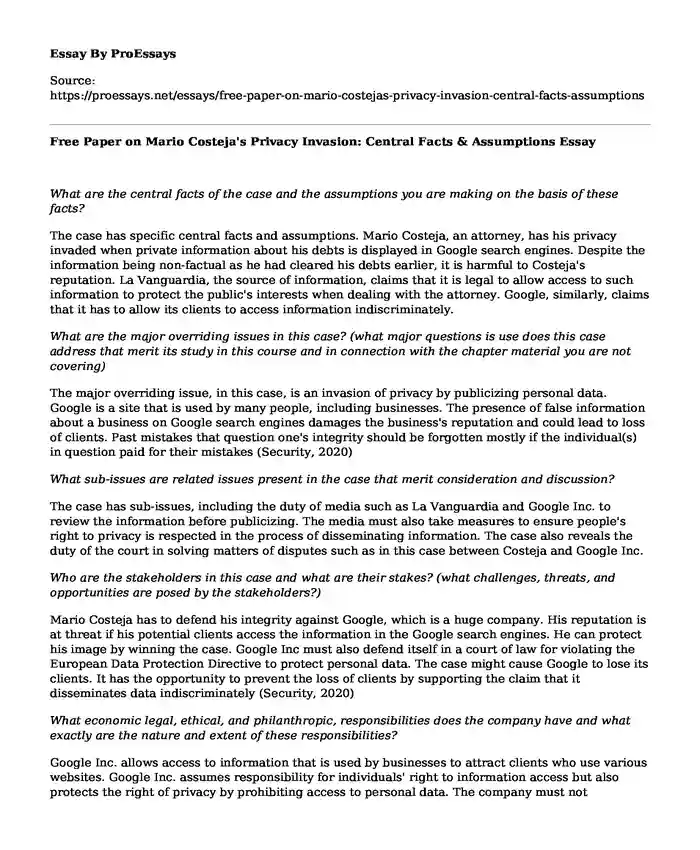What are the central facts of the case and the assumptions you are making on the basis of these facts?
The case has specific central facts and assumptions. Mario Costeja, an attorney, has his privacy invaded when private information about his debts is displayed in Google search engines. Despite the information being non-factual as he had cleared his debts earlier, it is harmful to Costeja's reputation. La Vanguardia, the source of information, claims that it is legal to allow access to such information to protect the public's interests when dealing with the attorney. Google, similarly, claims that it has to allow its clients to access information indiscriminately.
What are the major overriding issues in this case? (what major questions is use does this case address that merit its study in this course and in connection with the chapter material you are not covering)
The major overriding issue, in this case, is an invasion of privacy by publicizing personal data. Google is a site that is used by many people, including businesses. The presence of false information about a business on Google search engines damages the business's reputation and could lead to loss of clients. Past mistakes that question one's integrity should be forgotten mostly if the individual(s) in question paid for their mistakes (Security, 2020)
What sub-issues are related issues present in the case that merit consideration and discussion?
The case has sub-issues, including the duty of media such as La Vanguardia and Google Inc. to review the information before publicizing. The media must also take measures to ensure people's right to privacy is respected in the process of disseminating information. The case also reveals the duty of the court in solving matters of disputes such as in this case between Costeja and Google Inc.
Who are the stakeholders in this case and what are their stakes? (what challenges, threats, and opportunities are posed by the stakeholders?)
Mario Costeja has to defend his integrity against Google, which is a huge company. His reputation is at threat if his potential clients access the information in the Google search engines. He can protect his image by winning the case. Google Inc must also defend itself in a court of law for violating the European Data Protection Directive to protect personal data. The case might cause Google to lose its clients. It has the opportunity to prevent the loss of clients by supporting the claim that it disseminates data indiscriminately (Security, 2020)
What economic legal, ethical, and philanthropic, responsibilities does the company have and what exactly are the nature and extent of these responsibilities?
Google Inc. allows access to information that is used by businesses to attract clients who use various websites. Google Inc. assumes responsibility for individuals' right to information access but also protects the right of privacy by prohibiting access to personal data. The company must not maliciously publicize data that is potentially harmful to individuals' public image. It also ensures the works of charitable organizations are available to as many search engines as possible (Web, 2020)
If the case involves a company's action, evaluate what the company did or did not do in handling the issue affecting effect it.
The court ruled that Google must remove irrelevant links related to individuals' names. Google hence removed Costeja's disputed information from its search engines despite allegedly having acted indiscriminately. This was reasonable as Costeja's privacy had been invaded, and his reputation was damaged by Google, allowing access to such non-factual information via its search engines.
What recommendations would you make in this case? If a company’s strategies our actions are involved, should the company have created at done the way I did? What action should the company take now, and why? Be as specific as possible, and include a discussion of alternators you have considered but decided not to pursue. Mention and discuss any important implementation considerations.
Personal data must not be made available to the public via Google search engines. Despite not being per the company's strategies, publicizing personal data in violation of the European Data Protection Directive is not logically reasonable. The company should employ strategies such as employing staff to ensure data is scrutinized before being made accessible via search engines. Other alternatives include assessing the sources of information to guarantee credibility before allowing access via the search engines. Essential considerations in making this process enforceable are employing adequate staff to ensure information expires with time and is delisted from site engines, data is scrutinized adequately for credibility before being publicized, and ensuring personal data is not publicized (Cyber, 2019)
References
Cyber, S. (2019). 8 Google tools to improve your online security. Google - About Google, Our Culture & Company News. https://about.google/stories/frontend/
Security, I. (2020, August 24). The real risk of Reputational damage. Information Security Buzz. https://www.informationsecuritybuzz.com/articles/the-real-risk-of-reputational-damage/
Web. (2020, January 21). How do people use Google, and why is it important? All Web Promotion. https://www.allwebpromotion.com/how-do-people-use-google-and-why-is-it-important/
Cite this page
Free Paper on Mario Costeja's Privacy Invasion: Central Facts & Assumptions. (2023, Nov 21). Retrieved from https://proessays.net/essays/free-paper-on-mario-costejas-privacy-invasion-central-facts-assumptions
If you are the original author of this essay and no longer wish to have it published on the ProEssays website, please click below to request its removal:
- Ledbetter v. Goodyear Tire & Rubber Co. Case Study
- Essay on The Town: Analyzing Crime Through Biological, Strain Theories
- Daniel Boone: Offender, Prisoner, HIV-Infected Pedophile - Case Study
- Jack & H.H Holmes: Synonymous Victorian Serial Killers - Essay Sample
- Essay Example on Evolving Labor Movements: Protecting Worker Rights in the U.S.
- Essay Sample on Juvenile Justice: Processes, Screening, & Diversion
- Secure Health Records: Ensuring Patient Privacy and Safety - Paper Example







